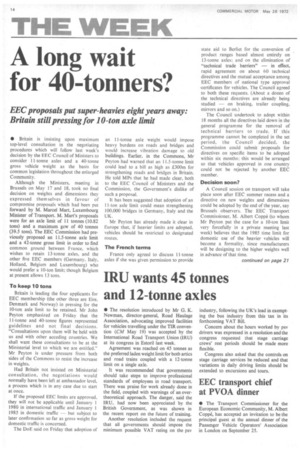A long wait for 40-tonners?
Page 16

If you've noticed an error in this article please click here to report it so we can fix it.
EEC proposals put super-heavies eight years away: Britain still pressing for 10-ton axle limit
• Britain is insisting upon maximum top-level consultation in the negotiating procedures which will follow last week's decision by the EEC Council of Ministers to consider 11-tonne axles and a 40-tonne gross vehicle weight as the basis for common legislation throughout the enlarged Community.
Although the Ministers, meeting in Brussels on May 17 and 18, took no final decision on weights and dimensions they expressed themselves in favour of compromise proposals which had been put forward by M. Marcel Mart, Luxembourg Minister of Transport. M. Mart's proposals were for an axle limit of 11 tonnes (10.82 tons) and a maximum gcw of 40 tonnes (39.5 tons). The EEC Commission had previously proposed an 11.5-tonne axle limit and a 42-tonne gross limit in order to find common ground between France, which wishes to retain 13-tonne axles, and the other five EEC members (Germany, Italy, Holland, Belgium and Luxembourg) who would prefer a 10-ton limit; though Belgium at present allows 13 tons.
To keep 10 tons Britain is leading the four applicants for EEC membership (the other three are Eire. Denmark and Norway) in pressing for the 10-ton axle limit to be retained. Mr John Peyton emphasized on Friday that the 11-tonne and 40-tonne figures represented guidelines and not final decisions. "Consultations upon them will be held with us and with other acceding countries. We shall want these consultations to be at the Ministerial level to which we are entitled." Mr Peyton is under pressure from both sides of the Commons to resist the increase in weights.
Had Britain not insisted on Ministerialconsultation, the negotiations would normally have been left at ambassador level, a process which is in any case due to start at once.
If the proposed EEC limits are approved, they will not be applicable until January 1 1980 in international traffic and January 1 1985 in domestic traffic — but subject to later confirmation so far as gross weight for domestic traffic is concerned.
The DoE said on Friday that adoption of an 1 1-tonne axle weight would impose heavy burdens on roads and bridges and would increase vibration damage to old buildings. Earlier, in the Commons, Mr Peyton had warned that an 11.5-tonne limit could lead to a bill as high as £300m for strengthening roads and bridges in Britain. He told MPs that he had made clear, both to the EEC Council of Ministers and the Commission, the Government's dislike of such a proposal.
It has been suggested that adoption of an 11-ton axle limit could mean strengthening 100,000 bridges in Germany, Italy and the UK.
Mr Peyton has already made it clear in Europe that, if heavier limits are adopted, vehicles should be restricted to designated routes.
The French terms France only agreed to discuss 11-tonne axles if she was given permission to provide state aid to Berliet for the conversion of product ranges based almost entirely on 13-tonne axles: and on the elimination of "technical trade barriers" — in effect, rapid agreement on about 60 technical directives and the mutual acceptance among EEC members of national type approval .certificates for vehicles. The Council agreed to both these requests. (About a dozen of the technical directives are already being studied — on braking, trailer coupling, mirrors and so on.)
The Council undertook to adopt within 18 months all the directives laid down in the general programme for the removal of technical barriers to trade. If this programme cannot be completed in the set period, the Council .decided, the Commission could submit Proposals for directives on specific items to be adopted within six months: this would be arranged so that vehicles approved in one country could not be rejected by another EEC member.
Decision soon?
A Council session on transport will take place soon after EEC summer recess and a directive on new weights and dimensions could be adopted by the end of the year, say Brussels observers. The EEC Transport Commissioner, M. Albert Coppe (to whom Mr Peyton put the case for a 10-ton limit very forcefully in a private meeting last week) believes that the 1985 time limit for domestic use of the heavier vehicles will become a formality, since manufacturers will be designing to the higher weights well in advance of that time.




































































































